2014加拿大魁北克省政府奖学金项目指南Rules_PBEEE_english
- 格式:pdf
- 大小:120.24 KB
- 文档页数:16
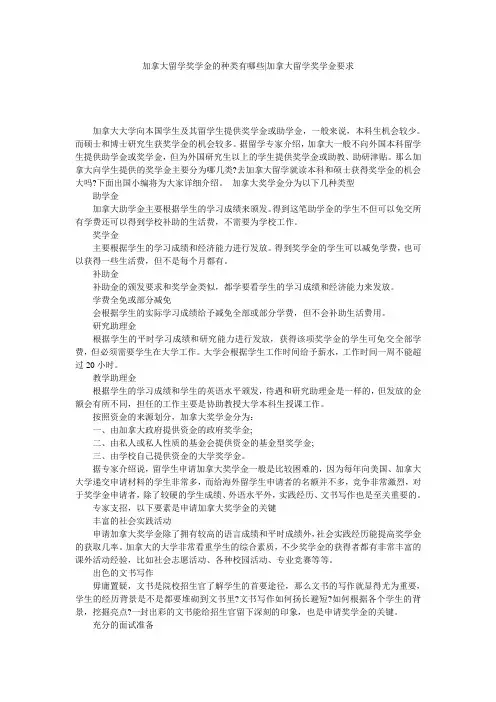
加拿大留学奖学金的种类有哪些|加拿大留学奖学金要求加拿大大学向本国学生及其留学生提供奖学金或助学金,一般来说,本科生机会较少。
而硕士和博士研究生获奖学金的机会较多。
据留学专家介绍,加拿大一般不向外国本科留学生提供助学金或奖学金,但为外国研究生以上的学生提供奖学金或助教、助研津贴。
那么加拿大向学生提供的奖学金主要分为哪几类?去加拿大留学就读本科和硕士获得奖学金的机会大吗?下面出国小编将为大家详细介绍。
加拿大奖学金分为以下几种类型助学金加拿大助学金主要根据学生的学习成绩来颁发。
得到这笔助学金的学生不但可以免交所有学费还可以得到学校补助的生活费,不需要为学校工作。
奖学金主要根据学生的学习成绩和经济能力进行发放。
得到奖学金的学生可以减免学费,也可以获得一些生活费,但不是每个月都有。
补助金补助金的颁发要求和奖学金类似,都学要看学生的学习成绩和经济能力来发放。
学费全免或部分减免会根据学生的实际学习成绩给予减免全部或部分学费,但不会补助生活费用。
研究助理金根据学生的平时学习成绩和研究能力进行发放,获得该项奖学金的学生可免交全部学费,但必须需要学生在大学工作。
大学会根据学生工作时间给予薪水,工作时间一周不能超过20小时。
教学助理金根据学生的学习成绩和学生的英语水平颁发,待遇和研究助理金是一样的,但发放的金额会有所不同,担任的工作主要是协助教授大学本科生授课工作。
按照资金的来源划分,加拿大奖学金分为:一、由加拿大政府提供资金的政府奖学金;二、由私人或私人性质的基金会提供资金的基金型奖学金;三、由学校自己提供资金的大学奖学金。
据专家介绍说,留学生申请加拿大奖学金一般是比较困难的,因为每年向美国、加拿大大学递交申请材料的学生非常多,而给海外留学生申请者的名额并不多,竞争非常激烈,对于奖学金申请者,除了较硬的学生成绩、外语水平外,实践经历、文书写作也是至关重要的。
专家支招,以下要素是申请加拿大奖学金的关键丰富的社会实践活动申请加拿大奖学金除了拥有较高的语言成绩和平时成绩外,社会实践经历能提高奖学金的获取几率。
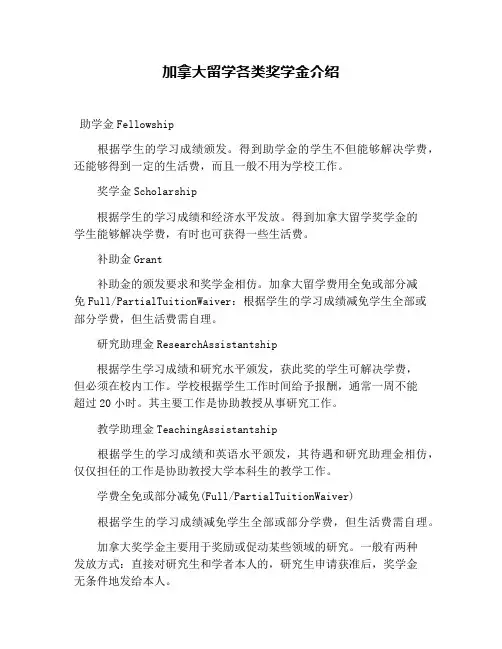
加拿大留学各类奖学金介绍
助学金Fellowship
根据学生的学习成绩颁发。
得到助学金的学生不但能够解决学费,还能够得到一定的生活费,而且一般不用为学校工作。
奖学金Scholarship
根据学生的学习成绩和经济水平发放。
得到加拿大留学奖学金的
学生能够解决学费,有时也可获得一些生活费。
补助金Grant
补助金的颁发要求和奖学金相仿。
加拿大留学费用全免或部分减
免Full/PartialTuitionWaiver:根据学生的学习成绩减免学生全部或部分学费,但生活费需自理。
研究助理金ResearchAssistantship
根据学生学习成绩和研究水平颁发,获此奖的学生可解决学费,
但必须在校内工作。
学校根据学生工作时间给予报酬,通常一周不能
超过20小时。
其主要工作是协助教授从事研究工作。
教学助理金TeachingAssistantship
根据学生的学习成绩和英语水平颁发,其待遇和研究助理金相仿,仅仅担任的工作是协助教授大学本科生的教学工作。
学费全免或部分减免(Full/PartialTuitionWaiver)
根据学生的学习成绩减免学生全部或部分学费,但生活费需自理。
加拿大奖学金主要用于奖励或促动某些领域的研究。
一般有两种
发放方式:直接对研究生和学者本人的,研究生申请获准后,奖学金
无条件地发给本人。
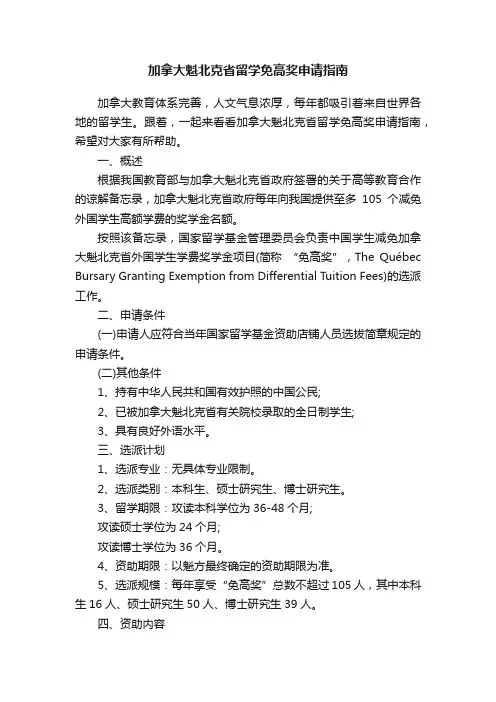
加拿大魁北克省留学免高奖申请指南加拿大教育体系完善,人文气息浓厚,每年都吸引着来自世界各地的留学生。
跟着,一起来看看加拿大魁北克省留学免高奖申请指南,希望对大家有所帮助。
一、概述根据我国教育部与加拿大魁北克省政府签署的关于高等教育合作的谅解备忘录,加拿大魁北克省政府每年向我国提供至多105个减免外国学生高额学费的奖学金名额。
按照该备忘录,国家留学基金管理委员会负责中国学生减免加拿大魁北克省外国学生学费奖学金项目(简称“免高奖”,The Québec Bursary Granting Exemption from Differential Tuition Fees)的选派工作。
二、申请条件(一)申请人应符合当年国家留学基金资助店铺人员选拔简章规定的申请条件。
(二)其他条件1、持有中华人民共和国有效护照的中国公民;2、已被加拿大魁北克省有关院校录取的全日制学生;3、具有良好外语水平。
三、选派计划1、选派专业:无具体专业限制。
2、选派类别:本科生、硕士研究生、博士研究生。
3、留学期限:攻读本科学位为36-48个月;攻读硕士学位为24个月;攻读博士学位为36个月。
4、资助期限:以魁方最终确定的资助期限为准。
5、选派规模:每年享受“免高奖”总数不超过105人,其中本科生16人、硕士研究生50人、博士研究生39人。
四、资助内容免除魁北克省向外国学生收取的高额学费。
加方未免部分的学费差额、学生在加的生活费和往返国际旅费等其它相关留学费用由留学人员自行解决。
五、注意事项1、申请人员需自行申办护照和签证。
2、延续“免高奖”申请人员可在获得高一级研究生学位的录取通知书后申请延续“免高奖”.3、“免高奖”项目为政府协议奖学金项目,获奖人员未经中魁双方批准,不得变更学习课程或学习机构、不能延长学习期限和奖学金期限。
4、获奖人员如出现学习成绩不合格、违反校规或违反国家留学基金管理委员会有关店铺的政策、法规、协议等情况,其奖学金资格将被取消。
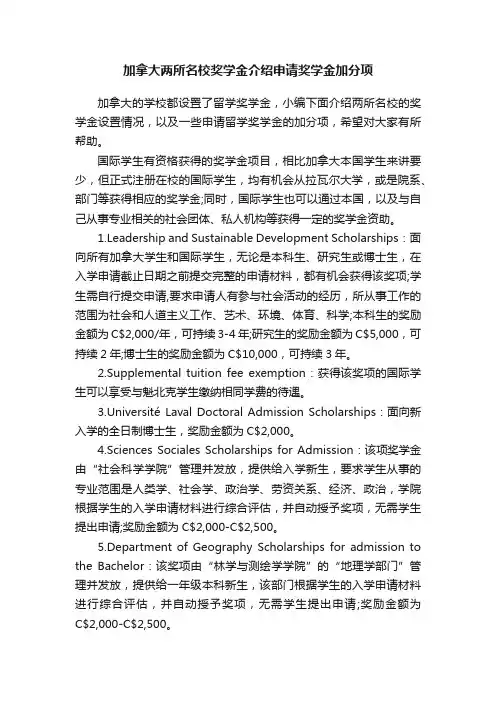
加拿大两所名校奖学金介绍申请奖学金加分项加拿大的学校都设置了留学奖学金,小编下面介绍两所名校的奖学金设置情况,以及一些申请留学奖学金的加分项,希望对大家有所帮助。
国际学生有资格获得的奖学金项目,相比加拿大本国学生来讲要少,但正式注册在校的国际学生,均有机会从拉瓦尔大学,或是院系、部门等获得相应的奖学金;同时,国际学生也可以通过本国,以及与自己从事专业相关的社会团体、私人机构等获得一定的奖学金资助。
1.Leadership and Sustainable Development Scholarships:面向所有加拿大学生和国际学生,无论是本科生、研究生或博士生,在入学申请截止日期之前提交完整的申请材料,都有机会获得该奖项;学生需自行提交申请,要求申请人有参与社会活动的经历,所从事工作的范围为社会和人道主义工作、艺术、环境、体育、科学;本科生的奖励金额为C$2,000/年,可持续3-4年;研究生的奖励金额为C$5,000,可持续2年;博士生的奖励金额为C$10,000,可持续3年。
2.Supplemental tuition fee exemption:获得该奖项的国际学生可以享受与魁北克学生缴纳相同学费的待遇。
3.Université Laval Doctoral Admission Scholarships:面向新入学的全日制博士生,奖励金额为C$2,000。
4.Sciences Sociales Scholarships for Admission:该项奖学金由“社会科学学院”管理并发放,提供给入学新生,要求学生从事的专业范围是人类学、社会学、政治学、劳资关系、经济、政治,学院根据学生的入学申请材料进行综合评估,并自动授予奖项,无需学生提出申请;奖励金额为C$2,000-C$2,500。
5.Department of Geography Scholarships for admission to the Bachelor:该奖项由“林学与测绘学学院”的“地理学部门”管理并发放,提供给一年级本科新生,该部门根据学生的入学申请材料进行综合评估,并自动授予奖项,无需学生提出申请;奖励金额为C$2,000-C$2,500。
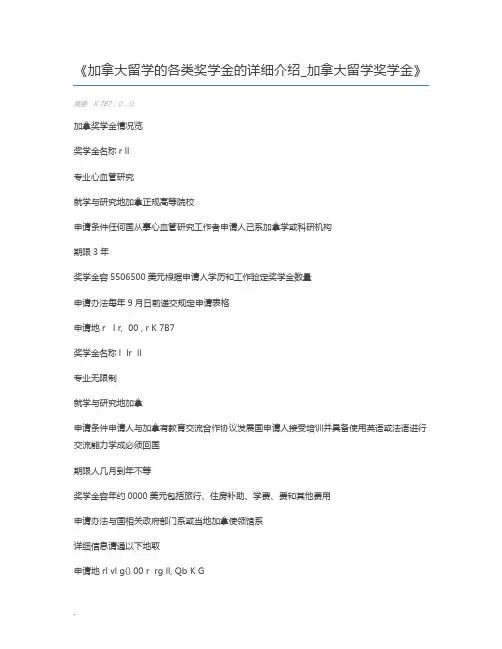
《加拿大留学的各类奖学金的详细介绍_加拿大留学奖学金》摘要:K 7B7,(),()加拿奖学金情况览奖学金名称r ll专业心血管研究就学与研究地加拿正规高等院校申请条件任何国从事心血管研究工作者申请人己系加拿学或科研机构期限3年奖学金容5506500美元根据申请人学历和工作验定奖学金数量申请办法每年9月日前递交规定申请表格申请地 r l r, 00 , r K 7B7奖学金名称l lr ll专业无限制就学与研究地加拿申请条件申请人与加拿有教育交流合作协议发展国申请人接受培训并具备使用英语或法语进行交流能力学成必须回国期限人几月到年不等奖学金容年约0000美元包括旅行、住房补助、学费、费和其他费用申请办法与国相关政府部门系或当地加拿使领馆系详细信息请通以下地取申请地 rl vl g() 00 r rg ll, Qb K G奖学金名称r vr Gr ll (30)B zv zrll Gr ll ()‘Br Gr ll ()l G r Gr ll ()ll L rl ll ()专业、B、、类奖学金不限;类奖学金商业管理申请条件面对所有国开放根据申请人学业成绩和专长定授予奖学金与否;加期须学习全日制正规研究生课程期限类奖学金有规定学习限制根据学者入学定奖学金生效;B、、和类奖学金可每年申请奖学金容取得类奖学金硕士研究生每年700美元博士研究生每年 300美元和类奖学金硕士水平每年3033美元博士水平每年3533美元;B类奖学金每年5000美元;类奖学金每年7500美元申请办法每年月日前与奖助学金办公室指导人员系申请地rr Gr rgr r vr 55 v Blvr rl, Qb 3G B奖学金名称 rl vl grl grg rr l Rr (r Rr )专业工程科学就学与研究地加拿学、工厂或实验室申请条件申请人发展国科学具有博士学位或相当学历和博士研究验并且国有稳定工作和不受任何影响接受奖学金期限年奖学金容担交通费、生活费和定研究费用申请办法每年报名截至日期0月5日申请地r r (rl Rl) rl grg Rr l (r) 00 K r , r K 5奖学金名称、Gr (58 999)B lr (66 999)专业成人教育、应用心理学、计算机、教育管理、高等教育学、哲学和历史教育、测量、社会学就学与研究地;加拿学或研究机构申请条件申请人须已获得加拿高等院校入学邀请信攻硕士或博士学位者要有较高英语水平期限年奖学金容类奖学金每年7000美元B类奖学金每年0000美元申请办法类奖学金每年月5日前通以下地, Gr 系;B类奖学金人选由定申请地r r () 5 Blr r r, r 5 V6奖学金名称xg l’ Rbl专业攻硕士阶段英语语言学或法语语言学就学与研究地加拿正规学申请条件国学生期限两学年。
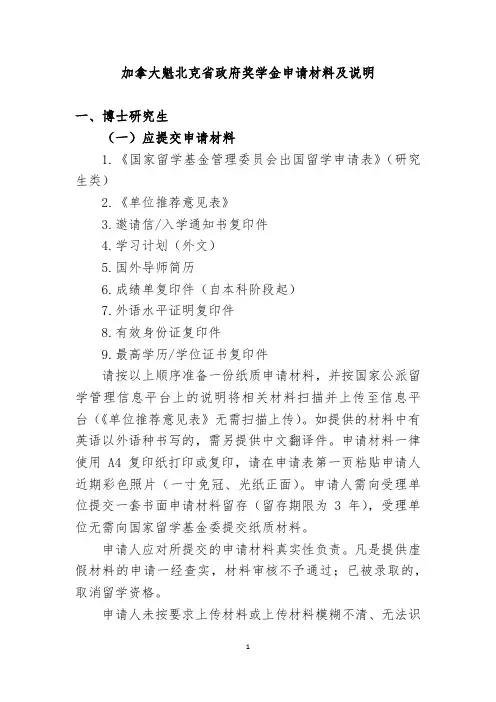
加拿大魁北克省政府奖学金申请材料及说明一、博士研究生(一)应提交申请材料1.《国家留学基金管理委员会出国留学申请表》(研究生类)2.《单位推荐意见表》3.邀请信/入学通知书复印件4.学习计划(外文)5.国外导师简历6.成绩单复印件(自本科阶段起)7.外语水平证明复印件8.有效身份证复印件9.最高学历/学位证书复印件请按以上顺序准备一份纸质申请材料,并按国家公派留学管理信息平台上的说明将相关材料扫描并上传至信息平台(《单位推荐意见表》无需扫描上传)。
如提供的材料中有英语以外语种书写的,需另提供中文翻译件。
申请材料一律使用A4复印纸打印或复印,请在申请表第一页粘贴申请人近期彩色照片(一寸免冠、光纸正面)。
申请人需向受理单位提交一套书面申请材料留存(留存期限为3年),受理单位无需向国家留学基金委提交纸质材料。
申请人应对所提交的申请材料真实性负责。
凡是提供虚假材料的申请一经查实,材料审核不予通过;已被录取的,取消留学资格。
申请人未按要求上传材料或上传材料模糊不清、无法识别或材料和要求不一致的,视为无效申请,材料审核不予通过。
(二)申请材料说明1.《国家留学基金管理委员会出国留学申请表》(研究生类)申请人需先登录网上报名系统,并按要求如实填写网上申请表;在填写完申请表并确认无误后,可按系统提示完成网上提交并打印。
申请表中的有关栏目应视实际情况和项目要求进行填写,如无相关情况可不填(如工作经历)。
申请人提交的书面申请表应与网上报名信息内容一致。
申请人提交申请表后,在受理机构接收前可以提回修改,受理机构接收后不能提回申请表。
如确实需在受理机构接收后修正内容,需联系受理机构退回,并在项目开通期内再次提交申请表。
因此,申请表填写完成后,请务必仔细核对无误后方可提交。
申请人需在申请材料“申请人保证”栏中签名。
2.《单位推荐意见表》单位推荐意见表在申请人打印申请表时由网上报名系统自动生成(申请人在网上报名阶段此表不在报名系统中显示)。
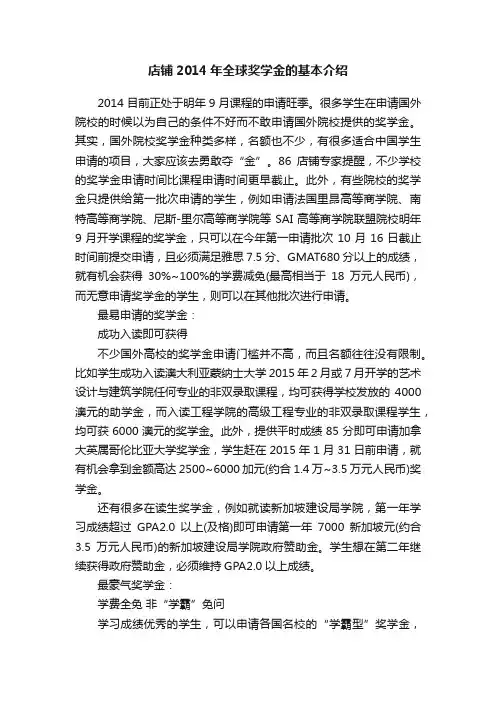
店铺2014年全球奖学金的基本介绍2014目前正处于明年9月课程的申请旺季。
很多学生在申请国外院校的时候以为自己的条件不好而不敢申请国外院校提供的奖学金。
其实,国外院校奖学金种类多样,名额也不少,有很多适合中国学生申请的项目,大家应该去勇敢夺“金”。
86店铺专家提醒,不少学校的奖学金申请时间比课程申请时间更早截止。
此外,有些院校的奖学金只提供给第一批次申请的学生,例如申请法国里昂高等商学院、南特高等商学院、尼斯-里尔高等商学院等SAI高等商学院联盟院校明年9月开学课程的奖学金,只可以在今年第一申请批次10月16日截止时间前提交申请,且必须满足雅思7.5分、GMAT680分以上的成绩,就有机会获得30%~100%的学费减免(最高相当于18万元人民币),而无意申请奖学金的学生,则可以在其他批次进行申请。
最易申请的奖学金:成功入读即可获得不少国外高校的奖学金申请门槛并不高,而且名额往往没有限制。
比如学生成功入读澳大利亚蒙纳士大学2015年2月或7月开学的艺术设计与建筑学院任何专业的非双录取课程,均可获得学校发放的4000澳元的助学金,而入读工程学院的高级工程专业的非双录取课程学生,均可获6000澳元的奖学金。
此外,提供平时成绩85分即可申请加拿大英属哥伦比亚大学奖学金,学生赶在2015年1月31日前申请,就有机会拿到金额高达2500~6000加元(约合1.4万~3.5万元人民币)奖学金。
还有很多在读生奖学金,例如就读新加坡建设局学院,第一年学习成绩超过GPA2.0以上(及格)即可申请第一年7000新加坡元(约合3.5万元人民币)的新加坡建设局学院政府赞助金。
学生想在第二年继续获得政府赞助金,必须维持GPA2.0以上成绩。
最豪气奖学金:学费全免非“学霸”免问学习成绩优秀的学生,可以申请各国名校的“学霸型”奖学金,部分院校不仅免学费,甚至还提供数额可观的生活费。
例如,学生可以凭高中平时成绩95分(总分100分),在2015年3月1日前申请加拿大西安大略大学10000加元(5.8万元人民币)的入学奖学金。
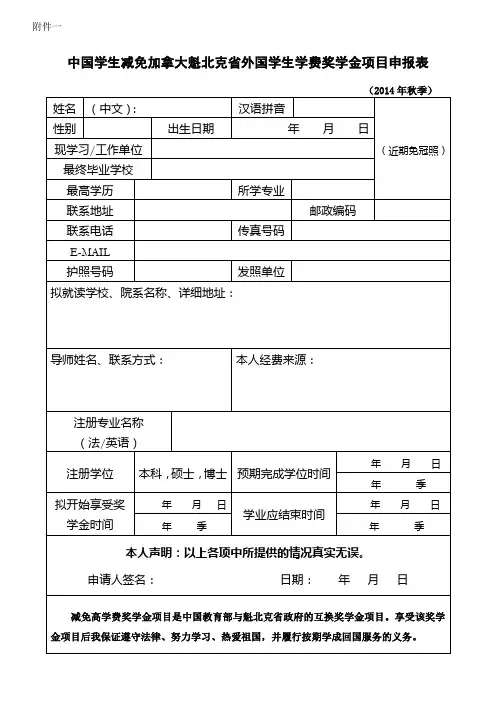
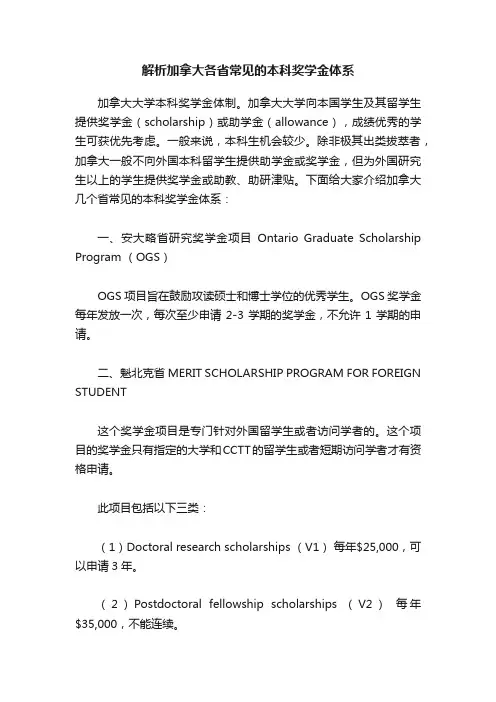
解析加拿大各省常见的本科奖学金体系
加拿大大学本科奖学金体制。
加拿大大学向本国学生及其留学生提供奖学金(scholarship)或助学金(allowance),成绩优秀的学生可获优先考虑。
一般来说,本科生机会较少。
除非极其出类拔萃者,加拿大一般不向外国本科留学生提供助学金或奖学金,但为外国研究生以上的学生提供奖学金或助教、助研津贴。
下面给大家介绍加拿大几个省常见的本科奖学金体系:
一、安大略省研究奖学金项目Ontario Graduate Scholarship Program (OGS)
OGS项目旨在鼓励攻读硕士和博士学位的优秀学生。
OGS奖学金每年发放一次,每次至少申请2-3学期的奖学金,不允许1学期的申请。
二、魁北克省MERIT SCHOLARSHIP PROGRAM FOR FOREIGN STUDENT
这个奖学金项目是专门针对外国留学生或者访问学者的。
这个项目的奖学金只有指定的大学和CCTT的留学生或者短期访问学者才有资格申请。
此项目包括以下三类:
(1)Doctoral research scholarships (V1)每年$25,000,可以申请3年。
(2)Postdoctoral fellowship scholarships (V2)每年$35,000,不能连续。
(3)Short-term research or professional development scholarships (V3)每月$3,000,最多可以申请4个月。
以上是关于加拿大大学本科奖学金体制的简单介绍,想要了解更多关于加拿大本科奖学金的信息欢迎关注。
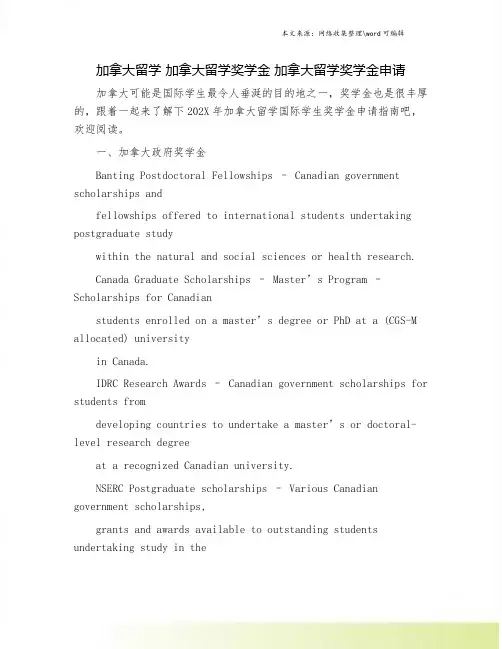
加拿大留学加拿大留学奖学金加拿大留学奖学金申请加拿大可能是国际学生最令人垂涎的目的地之一,奖学金也是很丰厚的,跟着一起来了解下202X年加拿大留学国际学生奖学金申请指南吧,欢迎阅读。
一、加拿大政府奖学金Banting Postdoctoral Fellowships – Canadian government scholarships andfellowships offered to international students undertaking postgraduate studywithin the natural and social sciences or health research.Canada Graduate Scholarships –Master’s Program –Scholarships for Canadianstudents enrolled on a master’s degree or PhD at a (CGS-M allocated) universityin Canada.IDRC Research Awards – Canadian government scholarships for students fromdeveloping countries to undertake a master’s or doctoral-level research degreeat a recognized Canadian university.NSERC Postgraduate scholarships – Various Canadian government scholarships,grants and awards available to outstanding students undertaking study in thenatural sciences or engineering at an accredited Canadian university. Funded bythe NSERC.Organization of American States (OAS) Academic Scholarship Program –Canadian government scholarships from the Organization of American States (OAS),open to graduate students from any OAS member state (including selectedcountries in Latin America and the Caribbean islands).Vanier Canada Graduate Scholarships Program – Canadian governmentscholarships available to doctoral students internationally, to study in Canadaat a participating university.Banting博士后研究奖学金:加拿大政府的奖学金提供给在自然和社会科学或健康研究中从事研究生学习的国际学生。
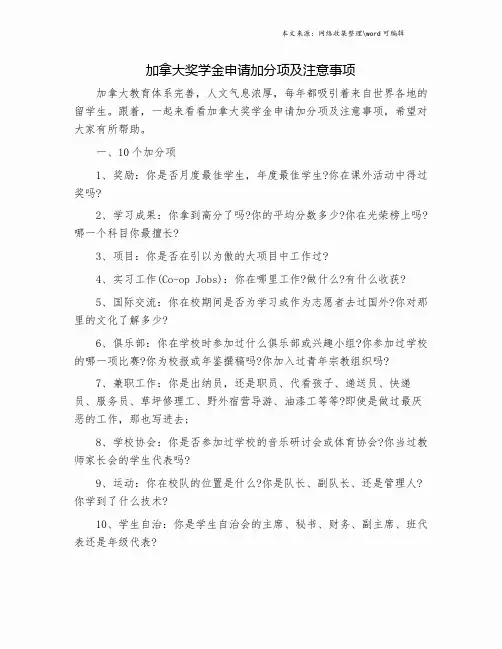
加拿大奖学金申请加分项及注意事项加拿大教育体系完善,人文气息浓厚,每年都吸引着来自世界各地的留学生。
跟着,一起来看看加拿大奖学金申请加分项及注意事项,希望对大家有所帮助。
一、10个加分项1、奖励:你是否月度最佳学生,年度最佳学生?你在课外活动中得过奖吗?2、学习成果:你拿到高分了吗?你的平均分数多少?你在光荣榜上吗?哪一个科目你最擅长?3、项目:你是否在引以为傲的大项目中工作过?4、实习工作(Co-op Jobs):你在哪里工作?做什么?有什么收获?5、国际交流:你在校期间是否为学习或作为志愿者去过国外?你对那里的文化了解多少?6、俱乐部:你在学校时参加过什么俱乐部或兴趣小组?你参加过学校的哪一项比赛?你为校报或年鉴撰稿吗?你加入过青年宗教组织吗?7、兼职工作:你是出纳员,还是职员、代看孩子、递送员、快递员、服务员、草坪修理工、野外宿营导游、油漆工等等?即使是做过最厌恶的工作,那也写进去;8、学校协会:你是否参加过学校的音乐研讨会或体育协会?你当过教师家长会的学生代表吗?9、运动:你在校队的位置是什么?你是队长、副队长、还是管理人?你学到了什么技术?10、学生自治:你是学生自治会的主席、秘书、财务、副主席、班代表还是年级代表?11、学校的义务工作:你是辅导员?教练助理?办公助理?图书馆助手?教师助手?技术支持?12、校外义务工作:在当地医院义务工作?当地公立学校?当地社团?政府办公室?社区报社?体育队?托儿所?疗养院?二、注意事项申请奖学金是个繁杂的过程,就如同申请大学一样。
可能有的学生会选择不申请算了,其实,就作者而言,申请奖学金,收获的不仅仅是金钱。
奖学金不仅能够获得资金支持,减轻负担,申请过程会让人成长和成熟。
而且还会给自己的简历又添一抹亮色。
对于博士研究生来说,物理、数学、化学并且能够满足加拿大留学奖学金申请条件,获得全奖的可能性比较大。
相比较之下,基础学科,类似于数学、物理这些学科奖学金可能性更大一些;加拿大留学奖学金申请条件比较高,一般拿奖学金的是直接录取的,学生如果本身雅思6.5分,另外高中成绩比较好,平均分85-90分以上,加拿大政府可以提供2000-6000加币不等的奖学金。
申请加拿大奖学金的途径和方法作者:来源:《出国》2021年第12期加拿大素来重视教育,不仅学费低廉,而且为莘莘学子提供数万种奖学金,其中不少是面向国际留学生。
这年头,留个学不容易。
奖学金虽不是留学的必要条件,但能获得奖学金,不仅能减轻家庭负担,还能为人生添上一抹亮丽。
那么,国际留学生要申请加拿大奖学金,都有什么途径和方法?加拿大奖学金名目繁多,难以尽述,但主要分为以下几种:一、大学奖学金许多大学提供入学奖学金,金额从数百加元到数千加元不等。
有些是自动授予,有些需要申请。
1. 多伦多大学多伦多大学每年会为新生提供约2400个奖学金名额,总额超过520万元。
此外还有学院和大学课程奖学金,主要发放给表现出色的学生,所有学生均可申请。
链接:http://www.sgs.utoronto.ca/currentstudents/ Pages/Scholarships-and-Awards.aspx2. 英属哥伦比亚大学1)国际学生人道主义奖学金专门为来自贫困、战争频发地区的杰出留学生设立。
有困难无法继续完成学业,且成绩优异的学生可以申请,奖学金金额足够支付相关课程的学习费用和生活费用。
2)明日国际领袖奖学金为国际学生提供学费与生活费,使学生能够继续留在加拿大学习。
3)总统入学奖学金无需申请,在提交入学申请时,学生自动获得评选资格。
链接:https://students.ubc. ca/enrolment/finances/awardsscholarships-bursaries3. 滑铁卢大学1)校长优秀奖学金2000加币入学奖学金以及1500加币的国际生奖学金或1500加币的研究奖学金(或两项都有),自动颁发,入学前无需申请。
要求入学GPA达95%或以上,入学后平均分达到80%以上的,可以繼续申请。
2)校长奖学金2000加币入学奖学金,GPA 90%- 94.9%,自动颁发,入学前无需申请。
3)优秀学生奖学金1000加币入学奖学金,GPA 85%- 89.9%,自动颁发,入学前无需申请。
加拿大大学奖学金的设置如何申请全额奖学金去加拿大留学的同学,通过申请奖学金来减轻家庭负担的同学,我提供了这些关于奖学金申请的内容,希望对你们有所帮助。
加拿大留学奖学金设置类型1、大学学士课程入学奖学金加拿大本科留学申请,为鼓励高学业成就的学生来上他们的大学,很多大学提供他们的学士课程学生一项一次的入学奖学金,这些奖学金的价值从数百加元到数千加元不等。
要符合这些奖学金的资格,你必须在高中最後一年,平均分数至少80分以上。
有些大学会自动考虑授与学生这项奖学金,但一些大学则要你提出另外的申请。
2、大学校长奖学金很多大学在学年结束时,授与成绩优秀的学生一项校长奖学金,不论他们是当地学生或外国学生。
要符合此项奖学金资格,您的平均成绩必须在全体学生里名列前茅,此奖学金通常是自动颁授的。
3、研究所奖学金大多数加拿大的研究所会提供在上学术性硕士课程的外国学生机会,去获得奖学金、研究助理(RA)、教学助理(TA)或免除国际学生学费(得到这项奖励的外国学生,将只需要付本地生的学费)。
申请时,您需在申请表上指出你想获得这些奖助或工作之一。
奖学金和免除外国学生学费一般是自动给予的。
很多大学只允许学生在上过一或二个学期後,去承担TA或RA的位置。
专业课程的奖学金,如MBA企管硕士、. 教育硕士或 .工程硕士,是非常少有的。
给博士课程学生的奖助,诸如:奖学金、TAs或者RAs,是广泛可能的。
4、受有补助大学的学费不论你是否获得奖学金,你将从加拿大政府收到一种“奖助”,这就是受有补助的学费。
因为加拿大的大学是由政府提供资金,他们大多操作在成本回收的原理之下,而不是要赚钱。
这表示说您不仅只需付基本的教育费用,更有可能,在某些情况下,您付得比成本更低。
加拿大留学奖学金申请事项1、如何申请加拿大奖学金去加拿大留学申请加拿大奖学金需要满足一定的条件,奖学金的发放一般是给成绩较为优异的学生,申请时,需要提交托福/雅思成绩、GRE 成绩以及相关申请的材料(简历,推荐信,计划书及成绩单等)。
加拿大留学奖学金设置情况全面了解介绍加拿大的奖学金根本上可以分为:入学奖、系主任奖、学科奖、课程奖、全奖、全校奖、以及书本奖、特殊工程研究奖等。
奖学金的发放在本科有三个阶段:入学,优秀成绩,优秀代表。
入学奖就是学生在入学的时候所获得的奖学金,奖学金的额度一般在500加币到1万加币。
一般是分4年发放的,也就是说假设你获得1000加币的入学奖学金,那么会在每个学年发放250加币到你的学生账户里,很抱歉不能提现的哦!入学奖的额度都不是很大,但是由于申请的门槛比拟低,所以会起到很好的吸引学生的作用。
而作为留学生,无论金额的多少能得到奖学金都是很骄傲的事情。
申请的方法就是在你申请入学的同时提交奖学金申请表。
这样大学会根据你申请的时候曾经的高中或者大学期间的成绩来判定你是否够资格。
用一个比拟简单的方式来理解就是如果你的成绩平均分在85%以上的话是具备了入学奖学金申请的资格,一定会有一些奖学金的。
由于成绩优秀而获得的奖学金是在加拿大留学的时候最常见的奖学金种类。
优秀成绩类奖学金实际上并不是一个奖学金的名字而是这个类别的统称。
在这个类别下有:book prize课本奖,针对某一门课的学科奖,全年的成绩都在4.0以上GPA的系主任奖,校长奖等等。
这类奖学金的金额从最少的200加币的供学生去抵消购置课本开销的课本奖,到免除国际学生费用差异的优秀国际学生奖,乃至上万加币甚至免除全部开销的校长奖,可谓是金额巨大。
一般来讲这种奖学金不需要去申请,只要你足够优秀会自动的获得的。
真的是学霸到哪里都是受欢送的。
这一类奖学金很特殊,因为如果说前两种奖学金代表着公正和对于优秀学生的表彰,而这一类绝对是只针对小局部特殊人群而设立的奖学金。
比方:优秀中国留学生奖,优秀生物系女学生奖。
这类奖学金的金额浮动非常大,从200加币到4000,5000加币都是有的,但是都是一次性付清的。
申请这类奖学金的限制非常多,对于年龄,性别,国籍,等等都有着不同的限制。
MERIT SCHOLARSHIP PROGRAMSFOR FOREIGN STUDENT2015-2016All countries scholarshipsDoctoral research scholarships(V1)Postdoctoral scholarships (V2)Short-term research or professional development scholarships(V3)Québec-Brazil scholarshipsQuébec-Brazil Doctoral research scholarships (1B)Québec-Brazil Postdoctoral scholarships (2B)Québec-Brazil Short-term research or professional development scholarships (3B)Québec-China scholarshipsQuébec-China Doctoral research scholarships (1C)Québec-China Postdoctoral scholarships (2C)Québec-China Short-term research or professional development scholarships (3C)Québec-India scholarshipsQuébec-India Doctoral research scholarships (1I)Québec-India Postdoctoral scholarships (2I)Québec-India Short-term research or professional development scholarships (3I)Québec-Mexico scholarshipsQuébec-Mexico Doctoral research scholarships (1M)Québec-Mexico Postdoctoral scholarships (2M)Québec-Mexico Short-term research or professional development scholarships (3M)Québec-Wallonia scholarshipsQuébec-Wallonia Doctoral research scholarships (1W)Québec-Wallonia Short-term research or professional development scholarships (3W)Update : July 15th, 2014TABLE OF CONTENTSIMPORTANT INFORMATION (3)OBJECTIVES (4)CLIENTELE (4)FEATURES OF THE SCHOLARSHIPS (4)ELIGIBILITY CONDITIONS AND CITIZENSHIP (5)PRESELECTION OF CANDIDATES (7)EVALUATION OF APPLICATIONS (11)INTEGRITY OF THE ASSESSMENT PROCESS (12)AWARDING OF SCHOLARSHIPS AND ANNOUNCEMENT OF RESULTS (13)RULES FOR USING SCHOLARSHIPS (13)FALSE OR MISLEADING INFORMATION (14)RESEARCH ETHICS AND CONFORMITY (15)RESPONSABILITIES OF THE FRQNT AND OF THE MESRS (15)GENERAL CONSIDERATIONS (15)CONTACT (16)IMPORTANT INFORMATION•Please, READ THE PROGRAMS RULES first.•Choose a Québec University and a director (doctoral degree) or a research supervisor (postdoctoral and short term research) who accepts to supervise your research project and recommend your preselection to the university or to the Réseau Trans-tech.•Preselection of candidates by a Québec university, the Réseau Trans-Tech (the Network of College Centers for the Transfer of Technologies), the China Scholarship Council (CSC), the Ministry of Foreign Affairs of Mexico (SRE), TERI University, the National Science and Technology Council of Mexico (CONACYT). Consult the deadlines to present an application for these organizations here:http://www.frqnt.gouv.qc.ca/en/bourses/index.htm•Deadline – preselection at FRQNT for the applications recommended by a Québec university, the Réseau Trans-tech, TERI University, Mexican SRE or CONACYT: September 30th, 2014.•Deadline – preselection at FRQNT for the recommended applications from CSC: March 31st, 2015.•Deadline – submitting e-form application and required documents for preselected candidates: November 1st, 2014 at Midnight (coordinated universal time UTC-5 Est time zone). •Deadline – preselection of applications for scholarships for candidates preselected by the CSC: May 31st, 2015 at Midnigh t (coordinated universal time UTC-5 Est time zone).•Mailing Address :Merit Scholarship Programs for Foreign Students (PBEEE)Fonds de recherche du Québec – Nature et technologiesProgrammes de bourses d’excellence pour étudiants étrangers140, Grande-Allée est4e étageQuébec (Québec) G1R 5M8CANADA•Announcement of results for all Programs : March 2015•Announcement of results for the students recommended by CSC: June 2015.1. In March 2004, the Fonds de recherche du Québec – Nature et technologies (FRQNT)was mandated by the ministère de l’Éducation, du Loisir et du Sport du Québec (MELS) to manage the Merit Scholarship Programs for Foreign Students. This mandate was renewed by the ministère de l’Enseignement supérieur, de la Recherche, de la Science (MESRS), which now finances the Programs. In 2008-2009, the Programs were enhanced with the addition of scholarships for students from emerging Asian (China and India) and American (Mexico and Brazil) markets and then, in 2009-2010, with the addition of scholarships for students from Wallonia (Belgium).OBJECTIVES2. The objective of the Merit Scholarship Programs for Foreign Students (PBEEE) is tosupport the internationalization of research activities in Québec's institutions of higher education, to attract the best foreign researchers and students, and to promote Québec universities and College Centers for the Transfer of Technologies (CCTT), abroad.3. The Programs cover higher education as a whole by giving to the CCTT researchers andadministrators the opportunity to participate.4. In a more generic way, the attribution of scholarships for foreign students aims at creatingcultural links and allowing the setting up of possible common scientific research projects.5. The Programs also represents an instrument for MESRS to support the Government ofQuébec's scientific policy.CLIENTELE6. These scholarships are intended for foreign students or researchers from all researchsectors (health, humanities and social sciences, arts and letters, natural sciences, and engineering) preselected by a Québec university, the Réseau Trans-Tech, the China Scholarship Council (CSC), TERI University, the Ministry of Foreign Affairs of Mexico (SRE) or the National Science and Technology Council of Mexico (CONACYT) to begin or continue studies or research activities in Québec. There is no privileged research sector.FEATURES OF THE SCHOLARSHIPS7. The Merit Scholarship Programs for Foreign Students has three components:•Doctoral research scholarships (V1, 1B, 1C, 1I, 1M, 1W);•Postdoctoral scholarships (V2, 2B, 2C, 2I, 2M);•Short-term research or professional development scholarships (V3, 3B, 3C, 3I, 3M, 3W).Value of scholarships8. In addition to the scholarship, MESRS offers all scholarship recipients an exemption frompaying the higher tuition fees required of foreign students and the medical insurance coverage offered by the Régie de l'assurance maladie du Québec (RAMQ).Value of scholarships for each component:9. Doctoral research scholarships (V1, 1B, 1C, 1I, 1M, 1W): $25,000 a year. Theduration of the scholarship is three years, with a possible extension of up to 12 months (monthly allowance of $1,000).10. Postdoctoral scholarships (V2, 2B, 2C, 2I, 2M): $35,000 for one year (cannot berenewed).11. Short-term research or professional development scholarships (V3, 3B, 3C, 3I, 3M,3W): $3,000 a month for a period of up to four months.ELIGIBILITY CONDITIONS AND CITIZENSHIP12.Candidates:•Must meet all eligibility conditions at the closing date of the competition, namely, November 1st, 2014 (a different closing date has to be confirmed for the students preselected by CSC).•Must have been preselected by a university, the Réseau Trans-Tech (a CCTT), TERI University, the SER or CONACYT before September 30th, 2014.•To the scholarship Québec-China program must be preselected by the CSC before March 31st, 2015.•Cannot have already received a Merit Scholarship for Foreign Students from MESRS, FRQNT or Fonds de recherche du Québec – Société et culture (FRQSC).•Cannot be a Canadian citizen or a permanent resident of Canada.•Cannot have applied for permanent resident status under Canadian immigration law. 13. Restriction for programs of study•Double doctoral degree programs are not admissible.•Québec-Wallonia scholarship applicants must have studied in a French-language university institution in Belgium AT THE TIME THEY ARE GRANTED THEIR SCHOLARSHIP.Doctoral research (V1, 1B, 1C, 1I, 1M, 1W) scholarship recipients must:14. Have a Certificat d'acceptation du Québec (CAQ) issued by the ministère de l'Immigration,de la Diversité et de l’Inclusion du Québec (http://www.immigration-quebec.gouv.qc.ca) and a student visa issued by the Canadian Consulate valid for the entire duration of their scholarship.Postdoctoral scholarship (V2, 2B, 2C, 2I, 2M) or short-term research or professional development scholarship (V3, 3B, 3C, 3I, 3M, 3W) recipients must:15. Have a work visa issued by the Canadian Consulate for the entire duration of theirscholarship.Eligibility periodDoctoral research component (V1, 1B, 1C, 1I, 1M, 1W)16. The doctoral research scholarships are intended for post-graduate students.17. Candidates are eligible for doctoral merit program scholarships from MESRS in the firstnine sessions of their doctoral studies. All doctoral sessions, funded or unfunded, completed before the scholarship takes effect, are used in calculating the eligibility period.18. A candidate admitted into a doctoral program from a bachelor’s program and one whofast-tracks into a doctoral program without writing a thesis must apply to the PhD scholarships competition (V1, 1B, 1C, 1I, 1M, 1W) to obtain the scholarship during the 3rd, 4th, and 5th years of his/her graduate studies (sessions 7th to 15th).19. The maximum duration of the scholarship is three years (nine sessions), with a possibleextension of up to 12 months.Postdoctoral component (V2, 2B, 2C, 2I, 2M)20. Postdoctoral scholarship are intended for researchers who have obtained their degree nomore than two years before the deadline of the competition or who submitted their dissertation by January 2016 at the latest, the deadline for the beginning of scholarship use.21. Postdoctoral research must be conducted in an institution other than the one that grantedthe Doctorate. The applicant’s doctoral supervisors and co-supervisors may not act as his/her postdoctoral supervisor, even if they have changed institutions.22. The duration of this scholarship is one year. This scholarship is not renewable.23. A scholarship of lesser duration can be granted if the duration of the research is less than12 months.Short-term research or professional development component (V3, 3B, 3C, 3I, 3M, 3W)24. Short-term research or professional development scholarships are intended for technicaland university students (option A) or researchers who have completed a doctorate no more than five years before the deadline for the competition (option B).25. The research or professional development must be conducted in an institution other thanthe one at which the student was enrolled when he or she applied.26. The duration of this scholarship is four months. The scholarship is not renewable. Ascholarship of lesser duration can be granted if the duration of the research is less than four months.Exceptional measures concerning calculation of the eligibility period27. The only exception to the rules governing the eligibility period concerns circumstancesbeyond the candidate's control.28. Candidates who suspend their studies due to maternity or parental leave can request anextension of their eligibility period for a maximum of 12 months. FRQNT reserves the right to refuse any request that is not sufficiently justified.PRESELECTION OF CANDIDATES29. Only candidates preselected by a Québec university, the Réseau Trans-Tech , TERIUniversity, the SRE or the CONACYT as of September 30th, 2014, can be part of this competition. Candidates to the Québec-China scholarship must be preselected by the CSC as of March 31st, 2015.30. The universities, the Réseau Trans-tech, TERI University, the SRE or the CONACYT andthe CSC assume full responsibility for candidate preselection. You can consult the various deadlines of the preselection competition for each Québec university and the Réseau Trans-tech on the FRQNT website.31. Those in charge of candidate preselection must refer to the instructions for candidatepreselection in the Merit Scholarship Program for Foreign Students.32. Those in charge of candidate preselection of a Québec university or the Réseau Trans-tech must complete the form for nominating candidates for the Merit Scholarship Programs for Foreign Students, available through the FRQNT EXTRANET website. It must be completed and transmitted electronically by 4 p.m. on September 30th, 2014. 33. Those in charge of candidate preselection for TERI University and the SRE orCONACYT must fill out a nomination form (PDF format) for each preselected applicant.These forms must be sent to the FRQNT via e-mail by 4 p.m. on September 30th, 2014, to pbeee@frq.gouv.qc.ca.Those in charge of candidate preselection at CSC must send the same nomination form to the FRQNT via e-mail by March 31st, 2014, at 4 p.m. to pbeee@frq.gouv.qc.ca.34. Candidates must meet all Programs eligibility requirements. Candidates proposed by aQuébec university, the Réseau Trans-tech, the CSC, TERI University, the SRE or CONACYT may be declared ineligible by the FRQNT if these criteria are not met.35. Candidates preselected to the general Program (V1, V2, V3) can also be preselected tothe Québec-Brazil-China-India-Mexico-Wallonia Programs. If several demands of scholarships are addressed to the present competition, a single copy of letters and required pieces must be sent to the FRQNT.All countries scholarships (V1, V2, V3)36. Universities can recommend four candidates per year for each of these threecomponents.37. The Réseau Trans-tech can recommend four candidates for Postdoctoral scholarships (V2)and Short-term research or professional development scholarships (V3).38. There are no quotas per country.Québec-Brazil scholarships (1B, 2B, 3B)39. Universities can recommend one candidate per year for each of these threecomponents..40. The Réseau Trans-tech can recommend one candidate for Postdoctoral scholarships (2B)and Short-term research or professional development scholarships (3B).Québec-China scholarships (1C, 2C, 3C)41. The CSC will recommend at least 10 applicants for each of the competition’s threecomponents. The CSC must therefore take Québec’s linguistic specificities into account. Québec-India scholarships (1I, 2I, 3I)42. Universities can recommend one candidate per year for each of these three components.43. The Réseau Trans-tech can recommend one candidate for Postdoctoral scholarships (2I)and Short-term research or professional development scholarships (3I).44. TERI University will select one Doctoral and two Short-term research grant holder.Québec-Mexico scholarships (1M, 2M, 3M)45. The SRE or the CONACYT will recommend at least 10 applicants for each of thecompetition’s three components. The Council must therefore take Québec’s linguistic specificities into account.Québec-Wallonia scholarships (1W, 3W)46. Universities can recommend one candidate per year for each of these two components.47. The Réseau Trans-tech can recommend one candidate for Short-term research orprofessional development scholarships (3W).SUBMITTING APPLICATIONS48. Preselected candidates are assigned a Personal Identification Number (PIN) and apassword. They must then complete an e-form on this webpage https://www.fqr.gouv.qc.ca/pls/cv/COFR.base?pOrg=NT&pType=ET .49. Only the 2015-2016 competition e-form and the other required documents will beaccepted. No appended documents or documents other than those requested are forwarded to the evaluation committee.50. E-forms are available only in the secure zone of the FRQNT. They must be completedand sent electronically.51. The deadline for sending scholarship applications is November 1st, 2014, at midnight(coordinated universal time UTC-5 Est time zone) (a different closing date has to be confirmed for the students preselected by the CSC). Files cannot be updated after the closing date for applications.52. Students are not required to enclose a printout of the application form with the documentsto be forwarded to the FRQNT. However, it is suggested that they keep a printed copy of the form for their files.53. The form may be completed in French or English. Candidates who apply in English mustprovide a French title for their project.54. IMPORTANT: Files that do not contain the information required to determineeligibility or enable evaluation by the deadline for submitting applications are not receivable by the FRQNT.Letter of reference and letter of acceptance of the supervisor55. The forms for letters of reference and letters of acceptance of the supervisor areavailable on the FRQNT website.•Quebec referees are urged to use the letter that can be accessed in the researcher’s personal e-file. Their letter can be sent to FRQNT electronically.•Foreign referees can use letter in PDF format (dynamic) and give it to the candidate in a sealed envelope or mail it directly to FRQNT. Please note that the PDF letter canbe printed, signed, scanned and then sent by email.56. Candidates for the postdoctoral scholarships and the short-term research andprofessional development scholarships must also provide a letter from their research supervisor. Note that the same supervisor cannot write both the letter of acceptance and the letter of reference.Supporting documents required:57. Documents submitted in a language other than French or English must be accompaniedby a translation of the original.58. Supporting documents required for all components of the program (V1, 1B, 1C, 1I, 1M,1W // V2, 2B, 2C, 2I, 2M // V3, 3B, 3C, 3I, 3M, 3W)• A photocopy of the identification page of a valid passport from the candidate’s country of origin or of any official document that enables the candidate’s citizenship tobe determined;•Transcripts for all university studies, whether completed or not (certificates, diplomas, Bachelor’s, Master’s, Ph.D. etc.). Transcripts for equivalences granted for coursestaken at other institutions or for previous programs must be enclosed with the file. Fortranscripts from outside North America, candidates must enclose a letter explainingthe grading system used by the institution concerned. The FRQNT reserves the rightto verify with institutions the authenticity of any information given by applicants.•Two letters of reference completed by the referees;•Acknowledgements of receipt from the editor for all articles submitted and notices received from editors for articles accepted for publication. (Acknowledgements ofreceipt for articles already published are not sent to the evaluation committee);•Copies of the announcement or confirmation letters for all of the scholarships received;•Submission notice (available in your e-file after the electronic form has been sent).59.Additional documents: Doctoral research component (V1, 1B, 1C, 1I, 1M, 1W)•An attestation from the registrar's office identifying part-time or unregistered sessions;•Official attestation of interrupted enrolment and, where applicable, a medical certificate indicating the duration of and the reason for the interruption60.Additional documents: Postdoctoral scholarship component (V2, 2B, 2C, 2I, 2M)• A photocopy of the Ph.D. diploma (or attestation of the first reading of the dissertation). If these documents cannot be provided, a certified copy of the doctoraltranscript is required;•The letter of acceptance from the research supervisor.61.Additional documents: Short-term research or professional developmentcomponent (V3, 3B, 3C, 3I, 3M, 3W)•The letter of acceptance from the research supervisor.62.Procedure for submitting the required supporting documentsCandidates must send their complete file directly to FRQNT by the deadline for applications, November 1st, 2014 (a different closing date has to be confirmed for the students preselected by the CSC), by regular mail postmarked or by e-mail pbeee@frq.gouv.qc.ca.63. Should it prove impossible for a candidate to submit all required documents by theprescribed deadline, in order to maintain the admissibility of the file, the candidate must provide an explanation as to why a given document is missing. FRQNT reserves the right to refuse any requests for extensions that are not sufficiently justified.Acknowledgement of receipt64. Candidates will be emailed an acknowledgement of receipt in December. The candidatewho has not received this notice must contact the program administrator before December 15th(a different closing date has to be confirmed by the students preselected by CSC).EVALUATION OF APPLICATIONSEvaluation criteria65. Applications are evaluated based on the following criteria and weighting:Excellence of university record66. The following indicators are used:•Cumulative average obtained;•Progression of studies;•Duration of studies;•Prizes and distinctions.Aptitude for research and relevant research experience, where applicable 67. The following indicators are used:•Reason for the application;•Candidate’s experience and achievements;•Leadership skills;•Referee’s letters of evaluation;•General presentation of the file.Scientific quality and interest of the research project and the proposed research environment68. The following indicators are used:•Quality of the supervision provided by the environment;•Clarity of the scientific objectives;•Relevance of the methodology for the objectives sought;•Originality of the project;•Contribution to the advancement of knowledge in the concerned field;•Compatibility of the proposed project with the supervisor’s field of research (doctoral scholarships only).Evaluation procedureRole of FRQNT69. FRQNT manages the Merit Scholarship Programs for Foreign Students for the MESRS. Role of multidisciplinary evaluation committees70. Admissible applications are submitted to evaluation committees composed of fourmembers representing all research sectors (health, humanities and social sciences, arts and letters, natural sciences and engineering).71. The evaluation committees compare the applications submitted according to theevaluation criteria in effect. Consequently, these committees are responsible for ranking all of the applications on merit.Role of the Programs administrator72. The FRQNT Programs administrator will prepare the annual call for applications andappoint the evaluation committee. The Programs administrator will also follow up with applicants, scholarship holders and the people who oversee student scholarships in Québec universities. The administrator will ensure that committee members respect the Programs assessment criteria and ethical rules in effect.Role of MESRS73. MESRS determines policy directions and grants the subsidy required for Programsfunding. It is the depository for the annual Programs report prepared by FRQNT. INTEGRITY OF THE ASSESSMENT PROCESS74. The FRQNT board members are not involved in the scientific evaluation of fundingapplications, and at no time may researchers, students or institutional authorities makecontact with the assessment committee chairperson or members. FRQNT have theright to withdraw an application from competition if there is any attempt to lobby thecommittee or sway the evaluation process.75. Every person recruited to sit on an assessment committee must comply with standardrules of confidentiality regarding the application packages, committee makeup,deliberations and recommendations. The assessment committee chairperson,members and outside experts are required to disclose any conflicts of interest and mustsign a written statement in this regard.AWARDING OF SCHOLARSHIPS AND ANNOUNCEMENT OF RESULTSAwarding of scholarships76. Scholarships are offered on excellence basis.77. The scholarship holders are selected by multidisciplinary committees formed byprofessors-researchers.78. Scholarships are offered according to the available budget.Announcement of results79. Results are announced by e-mail at the end of March. Candidates can access the letterof announcement in their application e-file. Each candidate is then informed of his/her ranking and can print the letter of announcement.80. Contacting members of the committees, who are subject to rules of confidentiality, isstrictly prohibited.81. Decisions are final and cannot be appealed. There is no review process.RULES FOR USING SCHOLARSHIPS82. The scholarship holders have to conform to all the rules described in detail in thescholarship holder’s guide.WARNING: Please note that to be awarded the scholarship, FRQNT has to receive a copy of the student visa (for doctorate student) or a copy of the work permit (for postdoctoral and short term research and professional development scholarship).83. At the time candidates receive the scholarship instalments, they must be dedicated full-time to the program of study, research, or professional development for which they were awarded the scholarship.84. Scholarships are awarded for the duration of the eligibility period, subject to presentationof progress reports deemed satisfactory for each full year of funding in the case of doctoral research (V1, 1B, 1C, 1I, 1M, 1W) scholarships, and at the midpoint of the funding period in the case of postdoctoral scholarship (V2, 2B, 2C, 2I, 2M).Period for using scholarships85. The scholarship period must begin between May 1st, 2015, and January 15th, 2016.86. Scholarships cannot be carried over from one year. It is therefore not possible to delaythe scholarship starting date after January 15th, 2016.87. Doctoral research (V1, 1B, 1C, 1I, 1M, 1W) scholarships are not retroactive and sessionscompleted before summer 2015 cannot be financed.Place where scholarship is used88. Scholarship recipients must attend the Quebec university or the CCTT at which theywere preselected and study or conduct research in Québec.89. Double doctoral degree programs are not admissible.Rules regarding concurrent scholarshipsHolding several scholarships concurrently is not permitted in the case of:90. Scholarships granted by government departments or by Canadian or Québecgovernment grant agencies.Holding several scholarships concurrently is permitted in the case of:91. Scholarships from the private sector, the government of the scholarship recipient'scountry of origin, and university scholarships.Remuneration92. Regardless of the exceptions relative to the paid work described in the scholarshipholder’s guide, scholarship holders may accept a job that does not represent more than 150 hours per session, provided their supervisor is in agreement. These activities can not hinder their research program.93. The salary that students receive from their supervisor for working solely on their researchproject is considered a scholarship for which concurrency is permitted.FALSE OR MISLEADING INFORMATION94. Under the Act respecting the ministère de l’Enseignement supérieur, de la Recherche, dela Science et de la Technologie (CQLR, c. M-15,1,0,1), any applicant who gives false or misleading information to obtain or procure financial support is guilty of an offence and liable to a fine. If found guilty, the individual is barred from receiving financial support fora period of up to five years.Where a legal person commits an offence, every director or representative of that legal person who was aware of the offence is deemed to be a party to the offence and is liable to a fine, unless he proves to the satisfaction of the court that he did not acquiesce to the commission of the offence.。